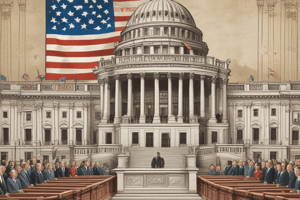Podcast
Questions and Answers
What is the primary distinction between a federal system and a unitary system?
What is the primary distinction between a federal system and a unitary system?
- In a federal system, there is no division of powers or checks and balances, while in a unitary system, there is a clear separation of powers.
- In a federal system, power is shared between different levels of government, while in a unitary system, power is held entirely by one central government. (correct)
- In a federal system, power is centralized, while in a unitary system, power is shared between different levels of government.
- Both federal and unitary systems have the same level of decentralization and local autonomy.
What is the role of states in a federal system?
What is the role of states in a federal system?
- States have the ability to experiment with novel government programs within their boundaries and implement federal policies. (correct)
- States are prohibited from making any decisions and are entirely controlled by the federal government.
- States have the same level of power and authority as the federal government.
- States have no autonomy and solely implement federal policies.
Which principle emphasizes the autonomy of states in the United States?
Which principle emphasizes the autonomy of states in the United States?
- The Supremacy Clause
- The Checks and Balances
- The Separation of Powers
- The Tenth Amendment (correct)
What is the purpose of decentralization in a federal system?
What is the purpose of decentralization in a federal system?
What is the purpose of the separation of powers and checks and balances in a federal system?
What is the purpose of the separation of powers and checks and balances in a federal system?
Flashcards are hidden until you start studying
Study Notes
Understanding Federalism and Its Impact on Government Systems
Federalism is a system of government that divides and shares power between multiple levels of government within a single territory. It is characterized by the interaction of two or more self-governing entities that share sovereign authority over the same geographical area. The United States is a prime example of a federal system, with its Constitution establishing a system of dual sovereignty where states have surrendered many powers to the federal government while retaining some sovereignty. Let's explore the key aspects of federalism and its implications on government structures.
Separation of Powers and Checks and Balances
A crucial aspect of federalism is the principle of separation of powers, which divides the government into distinct branches—executive, legislative, and judicial—each responsible for specific functions within its own domain. This division helps prevent any single branch from becoming too powerful and allows for checks and balances among them. For instance, the executive branch administers programs while the legislative branch writes laws, and the judiciary interprets these laws. This system ensures that no one branch dominates the others and fosters accountability.
Another important aspect is the principle of federalism's check and balance mechanism between different levels of governments. The national government may have limited authority, but the states retain certain powers. When conflicts arise between national and state laws, federal legislation will generally prevail due to the Supremacy Clause in the Constitution. However, states retain their right to manage local issues and maintain autonomy within their jurisdiction, providing a balance against excessive centralization of power.
Federal vs Unitairy System
Federalism contrasts with a unitary system where power is held entirely by one central government. While both systems share elements such as a division of powers and checks and balances, they differ in the extent to which decisions are made and implemented. In a federal system, decision-making authority is shared between different levels of governments, allowing for greater flexibility and responsiveness to local concerns. On the other hand, in a unitary system, decisions are made by a single entity, often leading to less accountability and potentially less diverse perspectives considered.
Role of States and Decentralization
States play a crucial role in federal systems, as they not only implement federal policies but also have the ability to experiment with novel government programs within their boundaries. This decentralization allows for innovation and provides individual states with a sense of autonomy while maintaining a cohesive national framework. The Tenth Amendment further emphasizes this, stating that any powers not delegated specifically to the federal government or prohibited from being exercised by the states are reserved for the states or the people.
Recently, the United States has seen debates over the balance of power between state and federal governments. Some argue that states should have more control over certain policy areas, while others believe that federal intervention is necessary to ensure consistency across jurisdictions. This ongoing dialogue highlights the importance of respecting the dual sovereignty established under federalism and the need for cooperation between different levels of government.
In conclusion, federalism plays a vital role in shaping government systems by dividing and sharing power between multiple entities within a single territory. Through principles such as separation of powers, checks and balances, the distinction between federal and unitary systems, and the involvement of states, federalism fosters accountability, stability, and innovation within governance structures. As policymakers navigate challenges and opportunities presented by modern realities, understanding these foundational concepts becomes increasingly important.
Studying That Suits You
Use AI to generate personalized quizzes and flashcards to suit your learning preferences.




